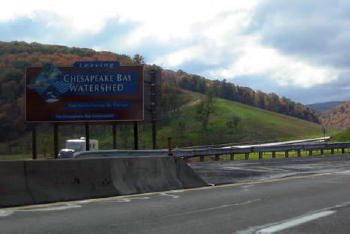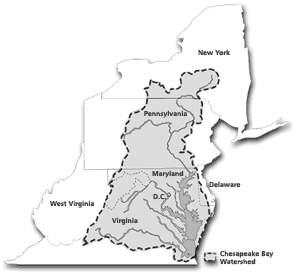





|
|
|
|
February 19, 2005
How big can a word get?
I'm not sure whether this post is about the power of language or the language of power. Maybe it's about the language "infrastructure" itself. (God, another weasel word I hate!) Anyway, there's an innocuous-sounding word floating around which, because it seems to have taken on emotional (if not quasi-religious) implications, has gained more and more power. It's now reached the point where it's become impossible to ignore. The word is "watershed." You can now see it appearing on road signs in a variety of places, including the Pennsylvania Turnpike, which lets you know when you're entering and leaving a vast place called the Chesapeake Bay "Watershed":  I do not exaggerate when I say the Chesapeake "watershed" is a vast place. All "watersheds" are vast; in fact, the entire world's land mass consists of nothing but "watersheds": All land is part of the watershed for some creek, stream, river or lake.Here's a picture of the "watershed" now trumpeted by taxpayer-funded turnpike signs:  So, a word government bureaucrats would have us regard with quasi-religious reverence actually means, well, drainage. All land is a watershed. So why dress it up with words? To soften the public up for more government regulations, perhaps? Take a look at these. A wide variety of land use restrictions are being promoted over a gigantic area, even going so far as to regulate how a homeowner might fertilize his lawn. They're talking about draining, all right. Draining the taxpayers. Interesting discussion here. I've read innumerable accounts of bureaucratic regulation of land use based upon claims of the existence of various "wetlands" areas, with the constitutional justification for federal restrictions based on Maritime jurisdiction -- the theory being that "wetlands" (even ordinary swamps), constitute a "federally protected waterway." I'm afraid even to research whether such jurisdiction might be extended from "wetlands" to "watersheds." This EPA-proffered definition is probably typical: A navigable waterway is typically part of a broader aquatic ecosystem which includes tributaries to that waterway, a groundwater system, adjacent wetlands, and other waters within the watershed that affect the chemical, physical, and biological integrity of the larger system.I don't like being manipulated by weasel words, and I hate it when they can't be escaped -- especially when they stare me in the face as a sort of challenge. It's tough to ignore a word which clearly means all land everywhere, and strikes me as contrived to create vast power for some. At the expense of almost everyone? I think such words suck -- especially when they try to take over the world. posted by Eric on 02.19.05 at 12:40 PM
Comments
Another beautiful photo, I must add. I love the look of those highways amid those green, rolling hills. Steven Malcolm Anderson (Cato theElder) the Lesbian-worshipping man's-man-admiring myth-based egoist · February 19, 2005 11:55 PM |
|
March 2007
WORLD-WIDE CALENDAR
Search the Site
E-mail
Classics To Go
Archives
March 2007
February 2007 January 2007 December 2006 November 2006 October 2006 September 2006 August 2006 July 2006 June 2006 May 2006 April 2006 March 2006 February 2006 January 2006 December 2005 November 2005 October 2005 September 2005 August 2005 July 2005 June 2005 May 2005 April 2005 March 2005 February 2005 January 2005 December 2004 November 2004 October 2004 September 2004 August 2004 July 2004 June 2004 May 2004 April 2004 March 2004 February 2004 January 2004 December 2003 November 2003 October 2003 September 2003 August 2003 July 2003 June 2003 May 2003 May 2002 See more archives here Old (Blogspot) archives
Recent Entries
• War For Profit
• How trying to prevent genocide becomes genocide • I Have Not Yet Begun To Fight • Wind Boom • Isaiah Washington, victim • Hippie Shirts • A cunning exercise in liberation linguistics? • Sometimes unprincipled demagogues are better than principled activists • PETA agrees -- with me! • The high pitched squeal of small carbon footprints
Links
Site Credits
|
|
The titles of your posts! "Lower is Sometimes Higher....", "Developing Rock Solid Relationships". "How Big Can a Word Get?".... I know of no other blogger who can equal the style of your titles.
Anyway.... Environmentalism has become just another "big word" for socialism -- government seizing control of private property. Or perhaps more like fascism or National Socialism, since you still nominally hold the deed to your property but the government dictates how it will be used. The Nazis, by the way, as is well known, were "Greens" before the term was invented.